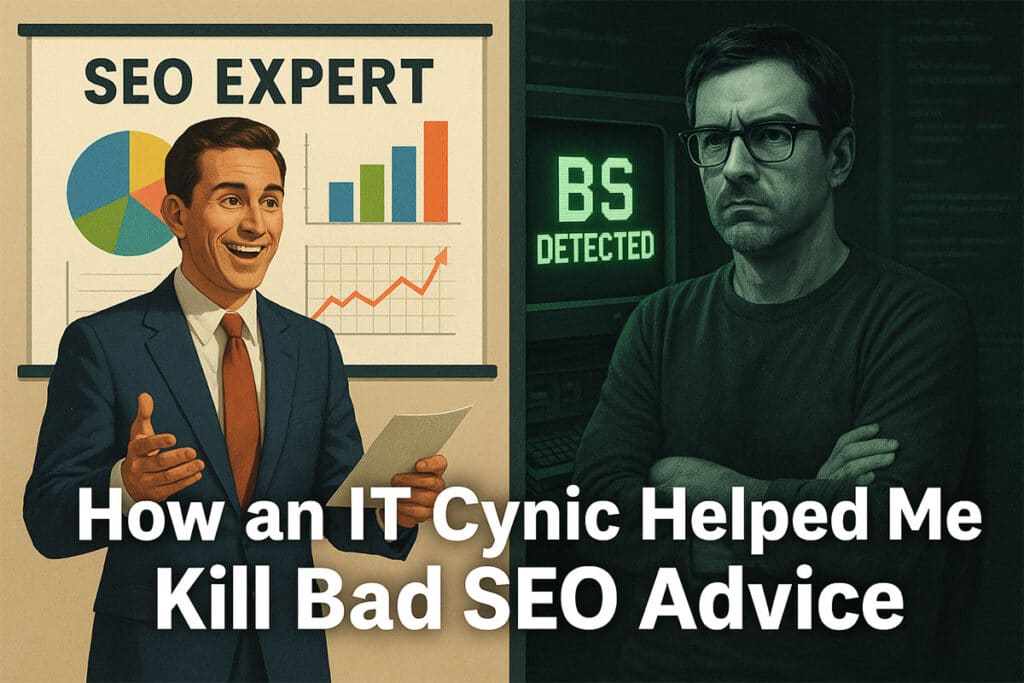Let me preface this by saying: SEO requires critical thinking.
Most people assume digital marketing and IT are natural enemies.
One wants speed, flair, and big growth metrics.
The other wants control, security, and no surprises.
And in the world of law firm marketing? That divide is usually even worse, especially when everyone’s more focused on vendor pitches than real strategy.
But back when I was Director of Digital Marketing for Jim Adler & Associates, I had the privilege of working under someone who completely broke that mold.
Enter Dustin, the IT Director. 🤓
But he wasn’t just an “IT guy.” He was a critical thinker, a programmer, and, to my surprise, one of the most creatively skeptical minds I’ve ever worked with.
And he changed the way I do marketing forever.
The Power of Cynicism (and Why Marketers Need More of It)
Dustin was a full-blown cynic. The kind who would raise an eyebrow at anything that sounded even remotely like marketing fluff.
At first, I thought it was a liability.
But then I started to realize: he was usually right. (I know he’s loving this right now. 😂)
Where most marketers, and especially legal SEO agencies, just regurgitated what Google or some guru said, Dustin asked:
“Who said that? And why are we trusting them?”
This wasn’t contrarian for the sake of it. He simply didn’t buy the industry’s default assumptions especially when they were backed by zero testing, no logic, or just a generic PowerPoint deck from an “SEO expert.”
That mindset helped me sharpen my own bullshit detector. It made me stop accepting vendor claims at face value.
The 301 Myth: One of Our First Big Wins
Back in the day, everyone in SEO parroted the same advice:
“Always 301 redirect old pages. Otherwise, you’ll lose SEO value.”
But Dustin and I questioned that.
We had hundreds of irrelevant, thin, and straight-up crappy pages on the Jim Adler site. Leftovers from old agencies, garbage filler content, and outdated junk that hadn’t pulled traffic or rankings in 16+ months.
We just told Google: “This trash doesn’t belong here anymore.”
Guess what happened?
Traffic and rankings improved.
Why? Because we stopped diluting the site’s topical authority.
We stopped signaling to Google that these throwaway pages were somehow worth preserving. We pruned the dead branches instead of tying them to healthy ones.
It was simple. It was logical. And it completely went against what every agency and SEO blog was preaching at the time.
We Structured the Site Like a Damn Library
Wanna hear about another win?
We knew most personal injury websites were a hot mess.
Blog posts competing with practice area pages, accident types scattered everywhere, and internal links going nowhere useful. Most law firms were treating their sites like a digital junk drawer.
But Dustin and I had questions.
We asked: How would a machine make sense of this?
And more importantly: How would a logical human organize this if they wanted to find something fast?
So, we rebuilt the site’s entire topical hierarchy.
We treated the site like a filing system.
That clarity paid off.
Pages started ranking. Crawlers got smarter. And users stopped bouncing like ping pong balls through the site.
Autonomy, Trust, and Results
Here’s the thing that surprised me most:
Dustin left me the hell alone.
There was no micromanaging. No “touch base” every 10 minutes. No need to CC him on every email.
And because of that, I grew faster than I ever had in any role before.
I took risks that paid off. I dug into analytics, ran weird tests, and restructured content in ways that agencies would’ve said were “too aggressive.”
The results speak for themselves. We tripled case signups. Rankings exploded. We built systems that didn’t need babysitting.
Because when a marketer is supported (not stifled), they deliver.
Why This Matters for Legal Marketing Today
If you’re running a law firm, here’s what you need to understand:
- Most legal marketers are too cozy with surface-level advice.
- Most SEO vendors don’t test anything. They just package buzzwords.
- And most IT/marketing teams are set up to compete, not collaborate.
But when you partner with someone like Dustin, someone who isn’t afraid to call BS and who understands how systems actually work, you gain an unfair advantage.
You get clarity in a sea of confusion and logic instead of jargon.
And, most importantly, real results.
My Closing Thoughts
I’ve worked with bosses who couldn’t think critically and marketers who couldn’t build a topical sitemap.
Dustin was a programmer. A cynic. A quiet force behind one of the most aggressive digital transformations I’ve been a part of.
And honestly?
Legal marketing could use a lot more Dustins.
P.S. Dustin’s still out there today, probably rolling his eyes at this article. ❤️


